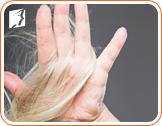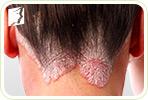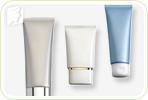
During menopause, women experience hormonal imbalances that can cause symptoms like hair loss. Testosterone production fluctuates at the same time that estrogen levels decrease, which may mean finding a few more hairs on your brush and in your bathroom drains. Even so, try not to worry. Because menopause is a time when bodily changes occur, it is common to experience a number of side effects. Hair loss, though typically associated with middle-aged men, has been reported in up to 30% of women before menopause and as many as two-thirds of women over the age of 65. Hope is not lost for women with thinning hair, though, as many causes of female hair loss are temporary. Below are a few tips for managing hair loss.
Examine Environmental Factors

Childbirth, high fever, and surgery are all examples of possible reasons for hormonal changes in the body. Other factors can also cause or exacerbate hormonal problems and hair loss. Remember, hair loss doesn't happen overnight, though it may sometimes seem like it. Stress and anxiety are well-known causes of hair loss over time. Also, medication and health conditions from up to three months ago could still be affecting you now.
Eat a Balanced Diet

Almonds, avocados, and olive oil are good sources of vitamin E, which is essential in maintaining blood circulation to the scalp. Alfalfa sprouts are rich in vitamins A, B2, B5, C, and K and possess traces of zinc, all of which aid in the upkeep of healthy hair. Avoid white sugar, and of course, caffeine and alcohol.
Exercise
Exercise alleviates stress, which not only promotes overall health, but can also reduce hair loss triggered by high stress levels.
Massage the Scalp

Try massaging your scalp with rosemary, aloe vera, or coconut oil and other hair growth-promoting substances. The massage stimulates blood flow to the scalp, increases circulation, and gets more nutrients to hair follicles, keeping them healthy. Massage can also significantly lower stress levels.
More Information
If you are experiencing menopausal hair loss and need more advice, talk with your doctor about the hair loss treatments available to you. He or she will be able to help you make an informed decision about the right course of action for your body.
Sources
- Bhat, G. , Kudva, P. & Dodwad, V. (2011). Aloe vera: Nature's soothing healer to periodontal disease. Journal of Indian Society of Periodontology, 15(3), 205-209. doi: 10.4103/0972-124X.85661
- Dinh, Q.Q. & Sinclair, R. (2007). Female pattern hair loss: Current treatment concepts. Clinical Interventions in Aging, 2(2), 189-199. Retrieved from http://www.ncbi.nlm.nih.gov/pmc/articles/PMC2684510/
- Harvard Health. (2009). Treating female pattern hair loss. Retrieved January 21, 2016, from http://www.health.harvard.edu/staying-healthy/treating-female-pattern-hair-loss
- Murata, K. et al. (2013). Promotion of hair growth by Rosmarinus officinalis leaf extract. Phytotherapy research, 27(2), 212-217. doi: 10.1002/ptr.4712
- Rele, A.S. & Mohile, R.B. (2003). Effect of mineral oil, sunflower oil, and coconut oil on prevention of hair damage. Journal of cosmetic science, 54(2), 175-192. Retrieved from http://www.ncbi.nlm.nih.gov/pubmed/12715094
- Riedel-Baima, B. & Riedel, A. (2008). Female pattern baldness may be triggered by low oestrogen to androgen ratio. Endocrine regulations, 42(1), 13-16. Retrieved from http://www.ncbi.nlm.nih.gov/pubmed/18333699



